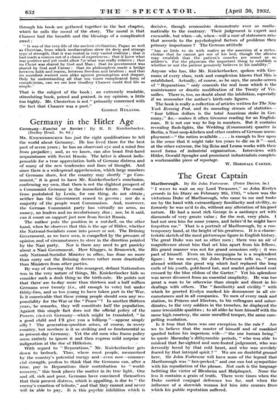Germany m the Hitler Age
Germany—Fascist or Soviet ? By H. R. Knickerbocker.
(Bodley Head. 8s. 8d.) •
Mit. KNICKERBOCKER has just the right qualifications to tell the world about Germany. Ile has lived there for the best part of seven years ; he has an observant eye and u mind free from prejudice ; and, as we know, can .also boast first-hand acquaintance with Soviet Russia. The latter is almost indis- pensable for a true appreciation both of German distress and of many of the new tendencies and lines of thought. And since there is a widespread apprehension, which large numbers of Germans share, lest the country may shortly * go Com- munist," it is good to have Mr. Knickerbocker's conclusion, confirming my own, that there is not the slightest prospect of a Communist Germany in the immediate future. The condi- tions postulated by Lenin, for one thing, do not obtain ; neither has the Government ceased to govern ; nor• do a majority of the .people want Communism. And, moreover, the German Communist party has virtually no arms, no money, no leaders and no revolutionary élan ; nor, be it said, can it count on support just now from Soviet Russia.
The author puts the position in a nutshell, on the other hand, when he observes that this is the age of Hitler, whether the National-Socialists come into power or not. The Brfining Government, as we have seen, is compelled by the pressure of opinion. and. of eircumstancesto steer in the direction pointed by the Nazi party. Nor is there any need to get panicky about a Nazi Government. Herr Klagges, in Brunswick, the only National-Socialist Minister in office, has done no more than carry out the Briining decrees rather more drastically than Ministers from other parties.
By way of showing that this resurgent, defiant Nationalism was in the very nature of things, Mr. Knickerbocker bids us consider such a drab "thing-as the birth-rate. He pOints out that there' are to-day more' than thirteen and a half million Germans over twenty (i.e., old enough to vote) but under thIrty-two, and so too young to have taken part in the War. Is it conceivable that these paling people should own any res- ponsibility for the War or the "Peace"? In another thirteen years,:- he remarks, they will constitute half the population. Against this simple -fact does -not the official policy of the Powers vis-a-vis Germany—which might be translated, " be a good child and I'll give you a lollipop "—appear simply silly_? The generation-question arises, of course, in :every country; but nowhere is it so .striking and so fundamental as in present-day Germany. Yet the old men who frame policy seem entirely to ignore it and then express mild surprise" or . indignation at the rise of Ilitlerisin.
With regard to " Reparations," Mr. Knickerbocker gets down' to bedrock. Thus, where most people, inesmerfred by the country's potential energy and—even now—commer- cial Strength, profess to think that the Germans can, after a time, pay in Reparations their contribution to world- recovery," this book place's the matter in its trite light.. One and till, rich and poor, Germans have convinced themselves that their present distress, which is appalling, is due to" the enemy's exaction of tribute," and that they cannot and never will be able to pay. It is this .psychic inhibitiOn which' is
decisive, though economists demonstrate ever so mathe- matically- to the Contrary: Their judgement is expert and excusable, but when—oh, when—will a race of statesmen arise that accords to the psychological factors of problems their primary • importance ? The German attitude •
"has as little to do with malice as the assertion of a melan- choliac that • he cannot get out of his bed,- though the alienist may establish that the patients muscles are sound as an athlete's. For the physician the important thing to establish is whether or not the patient genuinely believes in his inability."
Anyone who has, like Mr. Knickerbocker, spoken with Ger- mans of every class, rank and complexion knows that 'this is established. Actually, of course, as he says, the smoke-screen of " Reparations " only conceals the real issue which is the maintenance or drastic modification of the Treaty of Ver- sailles. There is, too, no doubt about the inhibition, especially if we remember the author's birth-rate figures.
The book is really a collection of article's written for The Neu, York Evening Post, and its unending stream of statistics- " four billion dollars is the total American stake in Ger- many," &c.—makes it often tiresome reading for an English. man. It is not our way to lisp in numbers. But it contains revealing flash-lights, the Wedding (Communist) quarter in Berlin, a Nazi soup-kitchen and other centres of German unem. ployment—" the ration available . . . . is enough to live upon in the sense that it might take ten years to die on it "—and, at the other extreme, the big Zeiss and Leuna works with their novel forms of industrial organization. Interviews with Hitler, Oswald Spengler and prominent industrialists complete a workmanlike piece of reportage. W. HORSFALL CARTER.






































 Previous page
Previous page